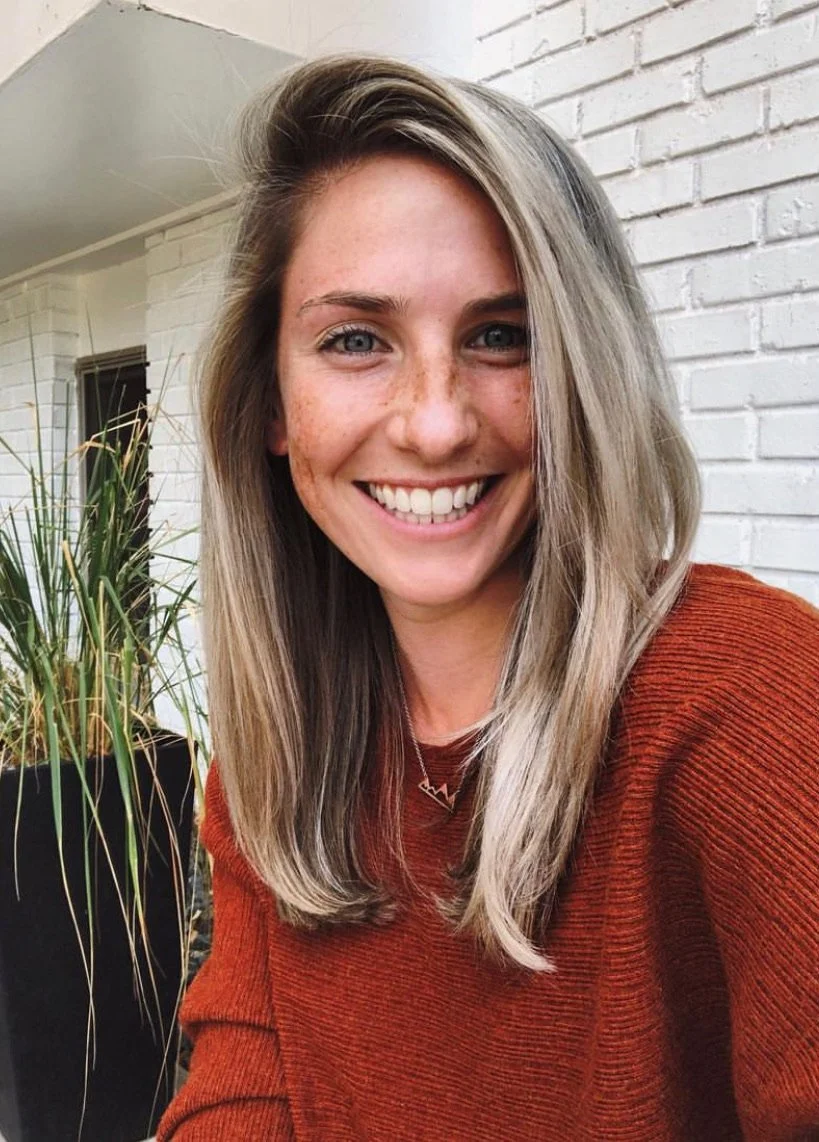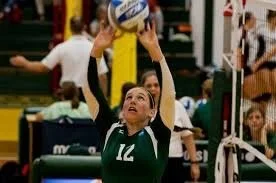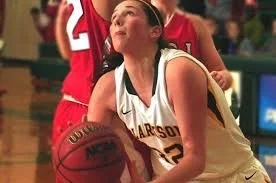Basketball And Volleyball Player Now Coach Interview: Brooke Butkovsky
BROOKE BUTKOVSKY played basketball and volleyball at Clarkson University in Upstate New York. She got her bachelor’s degree in Innovation and Entrepreneurship and then she graduated in 2017 there as well with her MBA. She is now the Director of Operations for the volleyball team at Colorado University. She grew up with 3 brothers who all played hockey so that sport is a big part of her life. She enjoys watching games such as the Colorado Avalanche who just won a Stanley Cup. In her free time she loves to play golf, which is sentimental to her because her grandfather taught her how to play. She lives with her boyfriend Fred and they have a black lab named Georgia who is 8 years old. Brooke loves to go camping, stand up paddle, yoga, workout at F45, and be outdoors. She is a host on the podcast After The Athlete which talks about the transition out of sports.
Below I have written most of what we talked about but you can listen to the full podcast on Anchor / Spotify or on Apple Podcasts.
Q: When did you start playing sports?
A: Probably around kindergarten time, so I was 4 or 5 years old. I started with soccer and basketball and there wasn’t really much more than that. I continued to keep it in my life basically forever.
I grew up in Connecticut in a little town called Monroe. My parents grew up there as well. My siblings and I went to the same high school as our parents. My aunts and uncles all went to the same high school too.
The weather was nice but thank goodness I played an indoor sport in Upstate New York. It would be so cold. Chill to the bone cold.
My parents both played basketball so that impacted me playing. Volleyball definitely kept me in shape for basketball in high school and college.
I played golf in high school which was difficult at points in the spring with the weather. Golf is forever a special thing for me since my grandpa taught me how to play.
My great grandpa got his first hole in one at age 92. That was the most special thing for all of us in the family since he’s been playing golf for so long and he finally got that.
Q: How did you handle playing two sports in college?
A: Basketball was my main sport going into college and I wasn’t sure what the time commitment would be like.
After my freshman year I had a pretty good season so I talked to the basketball coach and the volleyball coach and asked to play volleyball too.
They said yes but don’t get hurt. I loved doing both sports.
I was always going to TA’s and counselors and keeping my grades up because ‘student’ comes before the ‘athlete’ side of things.
I always used my resources for recovery in the training room.
It kept me focused on what I wanted to do which was to get my degree and play the sports that I love.
My routine was school, practice, homework and repeat.
I had 2 different groups of friends, and 2 different experiences and I loved them both the same.
My body did get worn out and my first year of volleyball I did get hurt. I had to miss my entire sophomore season of basketball because of it.
I had to learn how to lead differently, work with adversity and how to overcome that.
The seasons are back to back and overlapped for about a month so it was a wild time.
I would go to classes, then volleyball practice first because volleyball had priority of the court since they were in season and basketball was in preseason, then go to basketball practice and then have time to eat and get caught up on homework.
This was every day for about a month. The resources that I had was so helpful and I’m so glad I took advantage of that because it really helped get me through.
Q: How did you handle the setbacks of a shoulder injury and a concussion?
A: At first honestly it was really hard. I was always a leader by action and never by voice. I expected my teammates to see my physical efforts and follow that.
When I got injured I had to learn really quickly to lead differently.
Sitting at the end of the bench with my sling on, all I wanted to do was to be out there and help out the team.
A few games in, it was really hard. There’s no way I was handling it correctly.
Bringing up those resources, I was always talking to the assistant athletic director because she played multiple sports in college as well.
She was like a second mom away from home. She helped me change my body language and such and guided me to learn the coaching side of things, like why we run certain plays and such.
That led me to where I am now. It’s depressing at times to not work out and be out there with your teammates.
Talking to the right people and learning from people who had the same experiences helped me a lot.
We all come out stronger. When you flip your mentality, you control what you can control, and you get such a positive outcome from it.
Q: Do you feel like you would have done a different degree if you weren’t a student-athlete?
A: No, I don’t think so. I love the business side of things for everything.
The innovation and entrepreneurship spin to it is so fun. You can do whatever you want to do.
If I wasn’t an athlete, I would have been more involved with school more.
I didn’t have time for that as an athlete but that is the only thing I would have done differently.
Q: What was one of your favorite moments while competing?
A: My sophomore year of volleyball, which was right before I got hurt.
It was a different experience for me because I wasn’t a starter. I was more of a role player.
I was always thinking of ways to support my teammates.
We won our league! We were very successful.
We went to the NCAA tournament. We won NCAA regionals on our home court (we hosted) and made it to the Elite 8.
I can’t believe how much I cried because I was so happy and I couldn’t believe we did that as a team.
Our goal was to do well and win the Liberty league. We just kept playing our game getting through one by one and we ended up winning regionals.
My goal getting into college was to win a championship. Being able to play a second sport and getting that opportunity was unbelievable.
Fast forward to my first year coaching basketball as an assistant, we won the Liberty league for that and went to the NCAA’s.
I was hysterically crying so excited. My brother was visiting and there’s a picture of me cheering on the bench and he’s right behind me hyped up and the whole crowd is cheering.
Both of those moments are my all time favorites. I’m so happy I was able to experience that in both sports.
Q: In your first episode on After The Athlete you mentioned how challenging the transition from being teammates with everyone to being their coach the next year is. How did you handle that role change?
A: That was definitely the hardest for me. I had really great friends my senior year of basketball.
Being their coach the next year was hard for me and for them. It was difficult not being able to hang out, go to their apartments or dorms, party together anymore, etc.
I talked to the athletic director about it and she mentored me. Clarkson is a small school and it’s different because you see your friends out and you spent 3 or 4 years together and all of a sudden you cant hang out.
I made friends with coaches from other sports and that was great.
I was learning how to mature really quickly by not being a teammate anymore and having that professional level and boundaries with them.
They respect me in a way of having them listen when I give directions or have them change something up or those kind of things.
It took a lot but in the end it helped everybody and it helped my teammates by seeing me lead in a vocal way rather than on the court.
Since they knew how I was on the court when I played they knew not to make it hard on me leading in a different way. It definitely takes a long time to get used to.
Q: What was the transition out of playing competitive sports like for you? What did you do in your newfound free time?
A: First was becoming a coach instead of a player which was hard in itself on the friendship side of things.
Not playing and not participating in the lifts and practices was hard. I played basketball with people who wanted to play.
I kept at it for a few years which kept me sane. I kept a routine of lifting and playing and running but the competitive side of things was different.
After I graduated with my MBA at Clarkson, I moved to Colorado.
I didn’t know anyone or anything so I couldn’t play pickup games anymore and had to find a new gym.
I was still being athletic. I got into running a lot. I would run races and did a few half marathons which kept me in shape, feeling athletic, and competitive.
Last year I joined F45 and I’m obsessed with it because I feel like I’m on a team again.
I go at the same time every morning at 5:30 seeing the same crew of people.
If you’re not going to class, you hear it so it’s like when you miss practice your team knows.
I found ways to stay in shape and stay competitive and found a group to surround me that feels like a team.
Q: What’s your favorite podcast episode on After The Athlete so far?
A: I love all of them because they’re all so unique.
My favorite is the transition from sports.
I loved hearing all 3 of our experiences and all of our skills and qualities and lessons that we’ve taken from sports and transitioned to the real world.
The competitive side of things, the discipline, the time management, everything that you did as an athlete transitions to life afterwards.
There are times where I don’t want to do things and I get myself back on saying to myself no you have to do this and I feel like if that wasn’t drilled into my head at a young age as an athlete I don’t know how I would be.
I loved hearing Danika and Lexi’s side of things because they were so similar yet different.
Q: What aspect of the transition out of sports was the hardest for you? What advice can you give to athletes on what you learned from that?
A: I would say the hardest transition for me was probably making new friends in a sense.
As an athlete, your teammates are your friends. Going to school as a freshman you don’t know anyone but you have your teammates.
As a coach I had to figure out how to make friends with different interests which was hard.
I had other coach friends which were involved with different sports but we had the similarity of coaching.
It’s hard to meet new people and get in the groove of things again.
My transition from New York to Colorado was the hardest for me.
There’s only a few people that are my age working in sports at the D1 level.
Especially being that young you’re close in age with the players but you can’t be friends with them.
Making friends was definitely the hardest side of things especially as you get older with different responsibilities and being in different chapters.
That’s why I love F45 so much because we are not all the same age but we’re all friends. It takes time but my advice with the transition side of things is to take your time and do what you love and the friends and everything will come.
Before you transition, my advice is to enjoy every moment because you never know when that time is going to be taken from you whether it’s injury or graduation.
It’s the best time of your life being with teammates, those bus rides, the locker room, winning games, losing games, cherish it and enjoy.
Q: Do you have anything else to add?
A: Everybody’s experiences are different yet they’re the same.
When you go from being a student athlete to the real world it’s going to be hard but you’re not alone.
There are so many people out there that are feeling the same way and probably dealing with the same things.
You started when you were 4 years old.
That is why I love doing the After The Athlete podcast because we realize a lot of people can relate with us and we can all get through it together.
If you missed the last podcast, our guest was baseball coach Brian Billings. In that episode, we talked about his approach to coaching baseball at Pacific University using a growth mindset and giving his athletes the tools to be successful on and off the field. Up next we will have Devin Sorell as our guest on the podcast. In that episode, we will be talking about coaching changes, nagging injuries, and finding a job after sports.
If you have any more questions for Brooke, please leave comments below or contact me. If you or someone you know is struggling, please call or text the Suicide Hotline. It’s toll free and available 24/7 at 988 or 800-273-8255.
Rose Medal’s mission is to provide resources and support for current and former athletes. Please support our mission by making a donation.
Are you or someone you know currently struggling with what happens in life after sports? Or did you already go through that transition to life after retiring competitive sports and wish you had more resources and support? Have you ever wondered, “what do athletes do after they are done playing sports? What’s next after sports?” Do you feel like you dedicated so much to your sport and you don’t know what to do now that you’re done competing? You’re not alone. Check out the site and join us in the journey. Once an athlete, always an athlete.
More blog posts that are similar:




